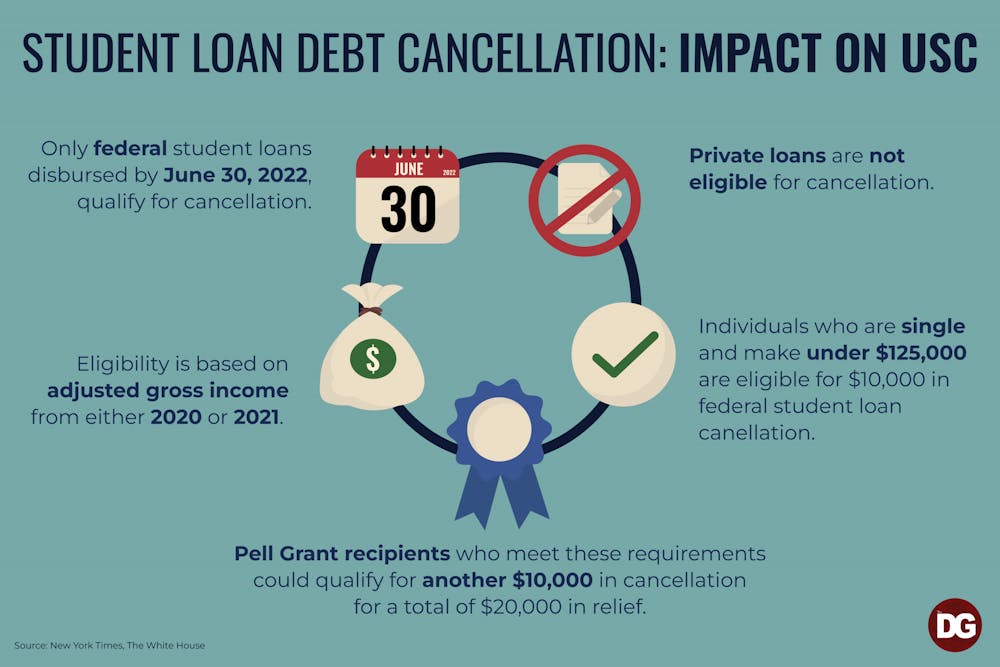USC students largely approve of the Biden administration's move to cancel up to $20K in federal student debt. Some question if the administration is doing enough to remedy college costs, while others disagree entirely with debt cancellation.
Of the 20 USC students The Daily Gamecock interviewed, only five said student debt cancellation changed their opinion of Biden, and two of those five said it changed their opinion negatively. Most students already have their opinion of the president, and even a policy that could have an immediate impact on their finances has not changed that, for the most part.
Quinn Weathers, a third-year finance and risk management student, said he has student debt and would accept debt cancellation, but he does not agree with it. He believes debt cancellation is too expensive and will worsen inflation.
"(Biden) promised (student debt relief) during his campaign. If I'm being honest, I didn't think he was actually gonna go through with it," Weathers said. "Props to him, I guess, for keeping up with his campaign promise, but I disagree with the concept."
Some argue canceling student debt is unfair to those who took on debt in the past and already paid it off. Mumin Adhami, a third-year mechanical engineering student, equated the cancellation of student debt to taxes: Even people who do not use roads still pay taxes to maintain them, which leads to better opportunities for everyone.
"If student loans were canceled, that would help out a significant population, and we have the money to do that," Adhami said.
Nicole Rottmann, a first-year computer engineering student, said debt cancellation is unfair to those who received a higher-paying job out of college and were able to pay off their student debt.
"It should be very little cancellation," Rottmann said. "Most people, I think, know they're going to have some sort of student loans when they go into it, and while I think higher education is too expensive, I do think people are mostly aware of what they're signing up for."
There is a long history of the incumbent president's party losing badly in midterm Congressional elections. Joshua Meyer-Gutbrod, a USC political science professor, said Biden's movement on this campaign promise was the president's attempt at reversing that trend. Meyer-Gutbrod is unsure if the attempt will succeed.
"If you promise something, you want to deliver," Meyer-Gutbrod said. "This was a major campaign promise for his campaign."
Only four students said they had already taken on student debt while six more said they had not yet but expect to in the future. In 2020, 55% of bachelor's degree recipients from four-year nonprofit colleges had student debt. South Carolina college students have an average of almost $37,000 in student debt.
Josiah Beam, a sophomore criminal justice student, said student debt cancellation is a step in the right direction, but more needs to be done to remedy college costs.
"Not a lot of people can actually afford college, but you're expected to go and get a degree so that you can get a good job to actually make money in the future and then you end up just obviously paying on the back end of it," Beam said.
Samantha Vanorder, a first-year nursing student, said all student debt should be canceled and that college should be free for everyone.

"Education, if it's so important in getting jobs and like living your life and paying for basic things, that shouldn't leave people in thousands of dollars of debt for the rest of their lives," Vanorder said. "People should be able to choose their schools freely."
Since the announcement, questions have emerged on whether Biden even has the power to unilaterally cancel federal student debt at all. Derek Black, a constitutional law professor at the USC School of Law, said the federal government does have the power to cancel student debt, but it is unclear how much.
"The question now is whether broader groups of people with really long-term student loan debt fall within the scope of that power too," Black said in an email. "I have seen compelling arguments on both sides."
Meyer-Gutbrod said the president almost always has the power to do something until someone else stops them.
"As the law is written, are they stretching it? Maybe, but not much. Can Congress stop them by changing the law? Absolutely. Can the courts step in and say you're stretching it too much, even when you aren't? Absolutely," Meyer-Gutbrod said. "The question of does someone have the power to do something in American politics is almost always a bit of a silly question."
University spokesperson Jeff Stensland said there should be more guidance in October on how USC students can apply for federal student debt forgiveness.


